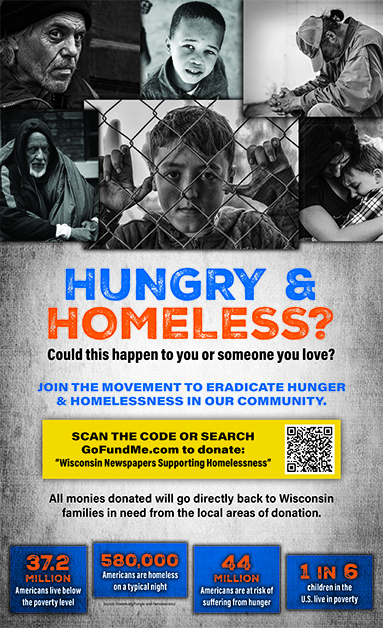MADISON – Wisconsin Department of Health Services (DHS) programming is providing assistance to those experiencing homelessness that is designed to create a sense of belonging and love.
Homelessness often sees the intersection of complex health and social challenges.
According to the National Alliance on Mental Illness (NAMI), of an estimated 4,515 people in Wisconsin considered homeless, 1 in 5 live with a serious mental illness.
The Wisconsin DHS Peer Services says that often “the best remedy for mental health and substance use challenges is the attention of someone who understands.”
Peer support mobilizes those with lived experience to provide support to others in similar situations, such as homelessness, substance use and mental and physical health.
A 2013 study completed by K.F. Bean, M.S. Shafer and M. Glennon found that through peer support, “98% of the participants remained in housing after 12 months. Individuals who were housed reported significant increases in their access to and utilization of planned health care services and quality of life, and reductions in their involvement in the criminal justice system.”
DHS Division of Care and Treatment Services Peer Coordinator Lynn Maday-Bigboy explained that with peer support training, the focus is on self-care as well as community care.
“We certainly talk about taking care of each other. We think about the delicate topics we talk about. We explore things such as trauma, historical collective trauma, supporting people, considering suicide diagnoses, the effects of stigma, systemic marginalization and oppression and also voluntary commitment,” she stated.
“We recognize that in self-care everyone does not have equal access to practicing self-care,” added DHS Division of Care and Treatment Services Peer Coordinator Marguerit Galindo
“With self-care, there comes a level of privilege and not everybody has that privilege. In our society, we know that many times when you hear somebody say that they’re going to take some time for self-care, it oftentimes has a monetary value to it. Not all people can do that.
“So, we’ve acknowledged that in community care we find connection and community engagement; we find deeper, deeper relationships and healing can take place within lost connections as well.
“Recovery and meaningful living are intertwined with community engagement and community care. [Recognizing] our interconnectedness and nurturing close relationships fulfills that innate need. So with that, we understand like we all know that Maslow’s Hierarchy of Needs is like that sense of belonging and love and every one of us has that need. So, when working alongside in a peer modeling and learning how to either a) connect back to their community that they’ve already had in place or b) cultivate community within new places by finding out what type of community they are interested in becoming a part of and then providing that resource and walking alongside of them.”
Galindo added that it is also important in these situations to check in with them.
“Are you checking in regularly with folks to see how they’re doing, not wait until they’re reaching out to you; but, actually reaching out to them and seeing how they’re doing and going beyond the ‘Hi, how are you?’ piece of things but really stopping and intentionally listening and hearing how they’re actually doing,” she said.
“When we hear those things and we hear the challenges or maybe they’re just sharing their joy with us. We can, you know, be intentional about our listening and validate those feelings that they’re sharing with us.”
Training and funding
Over 1,500 peer specialists are currently certified in the state of Wisconsin.
DHS Division of Care and Treatment Services Supervisor of Integrated Services Kenya Bright said that there are two different tracks of funding for the program.
“DHS funds about seven to 10 trainings a year, and then there are sometimes agencies that want to have their own training where all of their staff is trained. So, those eight or so agencies can come together as a community or agencies can themselves pay to have trainers train their staff. It’s the same curriculum. They don’t veer off of what the training would be. But those are called community trainings or private trainings because they’re not just generally open to the public,” she explained.
“Combined with the public ones that DHS funds and the community-specific trainings, we do over 20 trainings a year and we just continue to grow because more and more people are very interested in becoming certified.”
“We’ve had just, thinking off the top of my head, like clinics and hospitals that have sponsored trainings for community-specific (programming) because the value there is tremendous. Who can come along and walk alongside someone with a mental health and substance-use crisis,” Maday-Bigboy stated.
“Now we’ll have youth as a certification, certified peer specialist and then also the parent peer specialist. So, it really encompasses everybody, and the goal is to have anybody that wants to receive peer support in the state of Wisconsin have that accessibility to them.
“We are enough. We are all we need to survive. We always have been. We’re all we’ve got. Be good to each other. Take care of each other. That really encompasses what peers do.”
Five fundamental processes
Certification includes a 48-hour training session and a test.
The certification curriculum highlights five fundamental processes, including:
Connecting
Involves establishing a comfortable working relationship.
Exploring
Works with exploring who the person is and what their story is.
Supporting
Take all of the information you have gathered and ask what type of resources might aid them.
Planning
Exploring what pathways are available.
Advocating
Exploring their rights and options and walking alongside them to obtain them.
For more information, visit www.dhs.wisconsin.gov/peer-services/index.htm.


